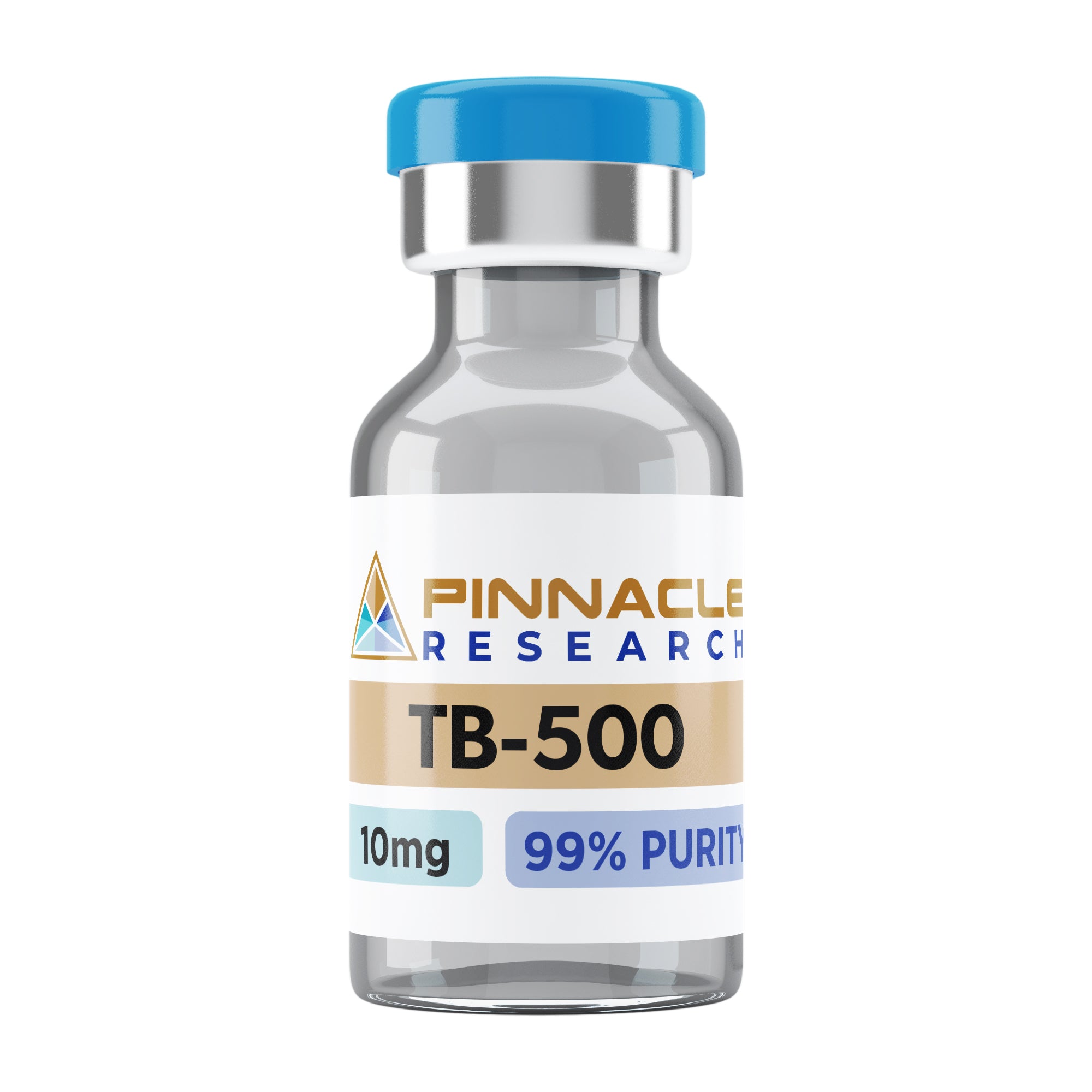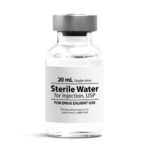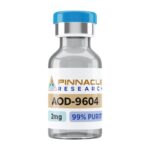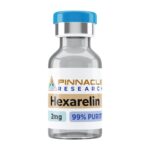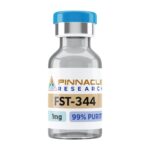About TB-500
TB-500 is also known as Thymosin Beta-4. The peptide has 43 amino acids in its sequence. Previous research studies in animal models suggest that the Thymosin Beta-4 peptide can improve the growth of blood vessels and decrease inflammation. Other critical benefits of the peptide include regulating wound healing and reducing oxidative damage to the heart cells and the central nervous system. Scientific study reveals that Thymosin Beta-4 plays a crucial role in other essential bodily functions like:
- Protection and repair of body tissues
- Regeneration and remodeling of cells after an injury or illness
The compound has also attracted the attention of researchers, particularly anti aging research studies.
What is TB-500 (Thymosin Beta-4)?
The TB-500 (Thymosin Beta-4) peptide is an artificial genre of the naturally occurring Thymosin Beta-4 found in animal and plant cells. It has 43 amino acids in its sequence. Several research studies have investigated the potential health benefits of Thymosin Beta-4 to overall human health.
In 2010, the New York Academy of Sciences did a study in the Annals, which supported the peptide’s potential in repairing cardiac muscles after an injury like a heart attack. The study focused on eliminating the limitations faced in stem cell therapy in handling similar cases. Findings from the study revealed that Thymosin Beta-4 inhibited myocardial cell death and stimulated blood vessel growth. The compound also activated cardiac processes after an injury to the heart, which accelerated the healing process.
The 2010 study by the New York Academy of Sciences is just one of the many studies showing the peptide’s potential to improve human health. The compound is still in the investigational stage. The consumption of the compound is strictly for research and educational purposes.
TB-500 (Thymosin Beta-4) Chemical Structure
- Sequence: Ac-Ser-Asp-Lys-Pro-Asp-Met-Ala-Glu-Ile-Glu-Lys-Phe-Asp-Lys-Ser-Lys-Leu-Lys-Lys-Thr-Glu-Thr-Gln-Glu-Lys-Asn-Pro-Leu-Pro-Ser-Lys-Glu-Thr-Ile-Glu-Gln-Glu-Lys-Gln-Ala-Gly-Glu-Ser
- Molecular formula: C212H350N56O78S
- Molar Mass: 4963.4408
- Synonyms: Thymosin Beta 4
TB-500 Effects and Research Studies
Enhancing Mucociliary transport
The Filamentous actin (actin/ F-actin) compound is naturally produced in the body and forms polymers, which thickens the sputum. F-actin is adversely affected in patients with cystic fibrosis. During a research study, patients with cystic fibrosis were administered Thymosin Beta 4. The study’s findings showed a connection between the peptide and the cohesiveness of sputum. The connection was dose- and time-dependent, where there was a reduction in the cohesivity of sputum after the administration of the Thymosin Beta 4 compound. The compound was combined with dornase alfa. The combined treatment therapy recorded a 71% improvement in mucus mucociliary transportation and a 44% improvement in mucus transport during coughing.
Muscle Injury
Several research studies confirm that the naturally occurring TB-500 stimulates the myoblasts and muscle-generating cells (myocytes). On the offset of an injury, the Mitochondrial RNA levels of the TB500 peptide increase. They help the body regenerate muscle fibers and address inflammation in the injured area. Increasing the local production of the Thymosin Beta 4 peptide in the body facilitates the migration of the incoming myoblasts, thus accelerating skeletal muscle regeneration.
Optical Health
Scientists did a 2009 study to investigate the overall benefits of TB500 in promoting optimal health. During the study, patients were administered eye drops with 0.01% TB500. The subjects exhibited an increased healing process after eye surgery. The population was sampled and investigated explicitly because they had healing complications caused by the diabetic condition. They also had a preference for eye complications, specifically diabetic retinopathy.
No side effects were experienced by the patients, even though the study group had more cases of headache, insomnia and dizziness than the control group. Researchers also confirmed that patients with diabetic retinopathy corneas had deficient levels of the TB500 peptide in the cornea compared to healthy individuals. Additionally, when patients with chronic dry-eye conditions were administered the TB500 eye drops, they experienced an improvement in symptoms, with most reporting minimal complications.
Liver and Kidney Diseases
The TB500 peptide was studied in patients suffering from chronic hepatitis B and nonalcoholic fatty liver disease (NAFLD). During the study, scientists discovered the peptide had zero correlation with the liver function tests (AST, ALT, TG) and HepB Virus levels. However, there was a negative correlation between the peptide and the fibrosis and inflammation scores. Lower levels of the TB500 peptide were experienced with worse cases of fibrosis and inflammation. The data and findings from the research created a scientific theory that TB500 can be used as a treatment option at the onset of some liver diseases.
Some of the most prevalent symptoms associated with kidney diseases include diabetic complications, inflammation, and fibrosis. A research study involving mice observed the effect of the peptide on kidney ailments. The healthy mice levels of the TB500 peptide had zero effect on the healthy kidney tissues. But lower peptide levels correlated with the deteriorating condition in mice with kidney diseases. The researchers concluded that low levels of TB500 in the body accelerated kidney disease. Researchers concluded that exogenous administration of artificial TB500 can help slow the disease progression and protect the kidney.
Healing Skin and Wounds
There are several studies on the effect of the TB500 peptide in healing. The peptide showed an accelerated healing process in patients with the following conditions: burns, ulcers, pressure ulcers, epidermolysis wounds, stasis ulcers, elderly subjects, and diabetic patients. Scientists observed this in both human and animal models. Findings from the study showed improved angiogenesis (blood vessel formation) and anti-inflammatory activity. The wounded areas also experienced increased platelet aggregation.
The Thymosin Beta-4 peptide is one of the most researched peptides in the medical field. There have been both human and animal model studies which have revealed various health benefits associated with the peptide. In 2015, a meta-analysis of Thymosin Beta-4 revealed that the peptide had a broad capability in various health conditions. Some of the critical areas where the peptide was found to be very useful include:
- Improving tissue regeneration
- Repairing the heart cells and tissues after damage caused by a heart attack,
- Facilitating healing of brain tissues after trauma, stroke and neurological diseases.
- Reducing consequences of viral infection and aging
- Repairing the ligament injuries, bones and spinal cord.
- Protection of the kidney and liver by slowing the progression of kidney and liver ailments.
More studies are being done to discover more health benefits associated with the compound. Despite being in the investigational stage, the peptide has exhibited great potential in improving the overall health of humans.
Thymosin Beta-4 has proven to be very effective as its naturally occurring counterpart. Even though it is still investigational, the compound has undergone human and animal trials and has proven safe and effective.
